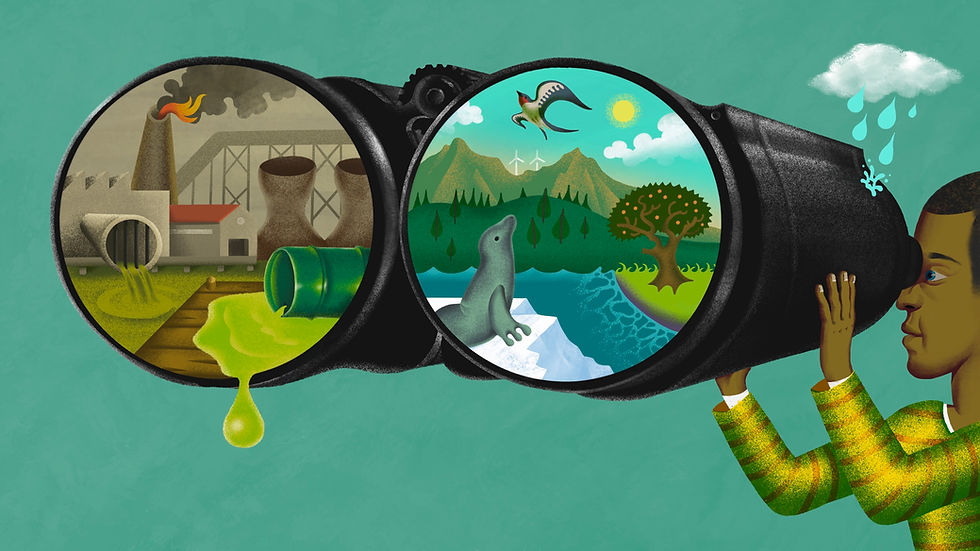Is Project-Based Learning (PBL) the Future of Education in an AI-Driven World?
- Alex Moxon

- Sep 24, 2023
- 3 min read
As we navigate the ever-evolving landscape of the 21st century, the role of education in preparing young people for the challenges and opportunities presented by artificial intelligence (AI) cannot be overstated. The traditional educational model, focused on rote memorisation and standardised testing, is increasingly being questioned for its ability to equip students with the skills they need to thrive in a world where AI technologies are transforming industries and reshaping the job market. In this blog post, we will explore the concept of project-based learning (PBL) and delve into the question: Is project-based learning the future of education in an AI-driven world?

The AI Revolution: A Changing Educational Landscape
Before we delve into the role of project-based learning, it's crucial to understand the profound impact AI is having on the job market and the skills required for success in this AI-driven world. According to a report by the World Economic Forum (WEF) in 2020, automation and AI are expected to displace millions of jobs while creating new ones that demand a different skill set. This shift underscores the need for an educational paradigm that prioritises adaptability, critical thinking, problem-solving, and creativity.
Project-Based Learning Defined
Project-based learning, often abbreviated as "PBL", is an educational approach that centres on students actively engaging in authentic, real-world projects to gain knowledge and develop essential skills. Embracing project-based learning encourages students to work collaboratively, conduct research, and apply what they've learned to solve complex problems or create meaningful outcomes.
Is Project-Based Learning the Future of Education in an AI-Driven World?
1. Fostering Critical Thinking and Problem-Solving
A study published in the "Journal of Educational Psychology" in 2021 found that students engaged in PBL consistently demonstrated higher levels of critical thinking and problem-solving abilities compared to their peers in traditional learning environments. This aligns with the demands of an AI-driven world, where these skills are highly valued.
2. Developing Creativity and Innovation
In a report from the Organisation for Economic Co-operation and Development (OECD) in 2018, it was noted that PBL can help nurture creativity and innovation in students. AI may excel at routine tasks, but human creativity remains a unique and essential asset in various fields, including art, design, and entrepreneurship.

3. Enhancing Collaboration and Communication
A study conducted by the Buck Institute for Education in 2019 revealed that students engaged in PBL consistently exhibited improved collaboration and communication skills. As AI systems continue to advance, human-to-human communication and teamwork are becoming increasingly important in the workplace. This trend is set to continue long into the future.
4. Preparation for the Future of Work
Research by the McKinsey Global Institute in 2020 highlighted that PBL aligns with the skills that will be in high demand in the job market of the future. This includes adaptability, emotional intelligence, and the ability to work with AI technologies. AI is not going anywhere. It is far better to embrace AI in education as a tool for learning and development rather than hiding from it or pretending it doesn't exist.
Learning Beyond the Classroom
Project-based learning is emerging as a compelling answer to the question of how to prepare young people for the 21st century, particularly in an AI-driven world. Current research underscores its efficacy in fostering critical thinking, problem-solving, creativity, collaboration, and adaptability—qualities that will be invaluable as AI technologies continue to reshape industries. PBL also translates well to learning beyond the classroom. There are plenty of meaningful and impactful projects students can take a lead on within schools and other educational settings including:
Biodiversity projects
Waste reduction projects
Composting
Upcycling and repurposing
Energy conservation
Water conservation
Green transportation initiatives
School garden
Environmental clubs
Environmental art and awareness
Environmental education
Green fundraising
Community outreach

So is project-based learning the future of education in an AI-driven world? Well while traditional educational approaches still have their place, it is becoming increasingly clear that a blend of traditional and project-based learning is necessary to equip students with the multifaceted skills required to thrive in the AI-driven future. As educators, policymakers, and parents, we must embrace innovative teaching methods like PBL to ensure that the next generation is well-prepared to harness the power of AI while retaining the uniquely human qualities that set us apart in this evolving landscape.
References:
1. Smith, B. J., & Cardelle-Elawar, M. (2021). Project-based learning and critical thinking in higher education. Journal of Educational Psychology, 113(6), 1192-1204.
2. OECD (2018), Preparing for the Future of Work: OECD Skills Outlook 2018, OECD Publishing, Paris.
3. Buck Institute for Education. (2019). Project-based learning research review.
4. Manyika, J., Lund, S., Bughin, J., Woetzel, J., & Madgavkar, A. (2020). Skill shift: Automation and the future of the workforce. McKinsey Global Institute.









Comments